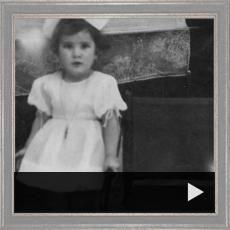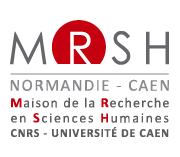Fragments of memory
Margherita Biagini was born in Florence in 1931, and did the middle school diploma. She wrote her memoirs between 1997 and 2000. The manuscript was given to the Archivio Diaristico Nazionale di Pieve Santo Stefano on 14 December 2000.
It was June of ’44, the Nazis had withdrawn north of the city, after they’d blown up the bridges over the Arno1On the 31st July 1944, the German army mines all of the Arnos’s bridges except the Ponte Vecchio. According to precise orders from the German government, every house, every street, every bridge able to hinder the Allied advance had to be destroyed. . The Allies, who had taken up a position at the Certosa of Galluzzo2Galluzzo is an area in the outskirts of Florence., were firing shell after shell, without bothering themselves much as to where they landed. The missiles fell at random on the inhabitants, and caused dozens of casualties.
There hadn’t been any food left in people’s house for several days, just a bit of water which we got from a well, where there were endless queues.
Hunger was now our companion, and fear was everywhere. With our lives constricted in time and space, the days passed with suffocating slowness as we waited for the liberation, our movements limited to the house and a small stretch of the road, because there were so many dangers. Our games were interrupted and our carefree minds obsessed with our hunger.
On that morning we heard that if we went to Zulimo, a peasant in Galluzzo, we could get a kilo of bread; but the road was towards the Certosa, so there was the shelling to worry about. It was a dangerous undertaking but you couldn’t go any other way.
I can still picture my older brother’s jubilation at the prospect of finally getting some food in his mouth.
He immediately volunteered to go and joked that he would dodge the shells by running zig-zag.
My mother wouldn’t let him, and decided that she should be the one to go.
A young girl of 12, I was to mind my young sister and brother, and she went off, with a promise that we’d have bread for supper.
It was a summer day, the sky was so clear and spotless that if you looked up you could forget the evil that hemmed us in.
I sang lullabies to my baby brother «hush-a-bye little chicken» 3Very popular italian lullaby. There was no smell of cooking in the kitchen because we hadn’t cooked any food for a while. «Daddy’s coming back from Rome» I sang; I was restless and anxious, without knowing why, «he’s brought you a lovely crown» I went on, stroking the baby’s cheek. Then I felt a sudden fear inside me, a sense of foreboding, and to calm myself down I turned to the window and looked up at that sky.
Soon I heard voices, loud and strained, I turned my gaze and saw some men carrying a stretcher bearing my mother. They were shouting «Hurry, let’s go!» as they ran towards a sort of little hospital that had been set up to help all the wounded.
She had been hit by shrapnel from a grenade.
I screamed and screamed; my mother was crying and she covered her face with the blanket so that we shouldn’t see her.
For all the people who lived on the other side of the Arno the war was over. The liberation army and the 5th American armoured brigade had freed that part of the city, and pushed the Germans northwards4On the 4th august 1944, Oltrarno’s districts were liberated..
We left the place where we had been living, after we were forced to leave our homes, with the same jubilation as someone who has been in the dark for a long time, and suddenly sees the light again.
On that day the sun seemed to me to be warmer and more resplendent, the cloudless sky was a spotless, intense pale blue, and I felt as though I was wrapped in a little cloud of light. I set off along Via Romana, past Palazzo Pitti, walking towards Ponte Vecchio. I saw my childhood haunts, the roads that had for years formed the familiar places of my home. I used to live in Costa San Giorgio. Now Via Guicciardini, Borgo San Jacopo, Via dei Bardi, Via Porta Santa Maria were reduced to craters of rubble. Furniture, ornaments, beams of the houses lounged precariously on the bits of wall that were still standing. They revealed, like an enormous gaping mouth, all the malevolence that is caused by human stupidity. War had invaded people’s private lives like an ugly harlot, violently attacking them and their things, overturning and destroying their daily lives. In one blow it had wiped out their way of living, and their memories; now, where there used to be life, there was just wreckage.
Everyone was enveloped in a kind of dumb hopelessness, stunned and disbelieving as they stumbled among their memories, gasping as they looked for anything that belonged to them, trying to rescue a piece of that past life, those memories, which had been taken away from them.
I was overwhelmed with terrible sorrow as I looked at this outrage. The sun no longer felt warm, and the sky seemed to have darkened, my sobs came quietly at first then broke out freely and noisily, and I wept for my lost childhood with all the tears I had.
It was a tiny, very old lady who brought me back to the present, clutching me by my arm. Curls of white hair stuck out from under the brightly coloured scarf tied under her chin, and her clear, blue, child-like eyes were fixed on a point in the distance. She shook me and said «Can you see it too, child?» I asked if this had been her house, she didn’t reply but held my arm tight and made a vague movement with her head which seemed to be a ‘yes’. «What is it I should see?» I asked. She stretched her hand towards a heap of rubble and shouted, in great agitation «Yes, it’s mine, I recognise it!» She had seen a photograph album, and then I saw it too – it was one of those albums in the Florentine style, cream with red and gold lilies all over it, who knows how many memories were held within its pages. With a speed that you wouldn’t have expected for someone of her age, the woman started forward, intent on reaching her lost treasure. A young man held her back, saying he would get it for her, and he went off, jumping over the rubble. I watched the thin figure, with his dark shock of hair, receding through that space, he bent down, and as he reached out his hand to grasp the album the woman exclaimed «Bravo!»
There was a loud boom and a burst of flame and before we ran for shelter we just had time to see the boy thrown into the air and then fall like a falling star. He had trodden on a German mine.
I went into a doorway with some other people, and without realising it I started shouting «Why? Why?», like a machine. A woman embraced me silently, stroking my head to comfort me. It was her caresses that brought back to me the sensation the sun could still be warm.
- 1. On the 31st July 1944, the German army mines all of the Arnos’s bridges except the Ponte Vecchio. According to precise orders from the German government, every house, every street, every bridge able to hinder the Allied advance had to be destroyed.
- 2. Galluzzo is an area in the outskirts of Florence.
- 3. Very popular italian lullaby.
- 4. On the 4th august 1944, Oltrarno’s districts were liberated.
- Numéro: XX005
- Lieu: Archivio Diaristico Nazionale di Pieve Santo Stefano, Arezzo, Toscane






